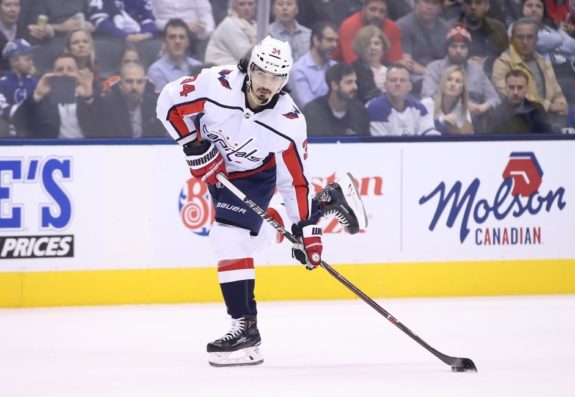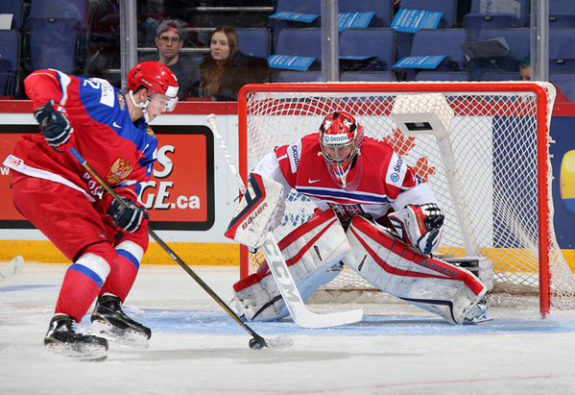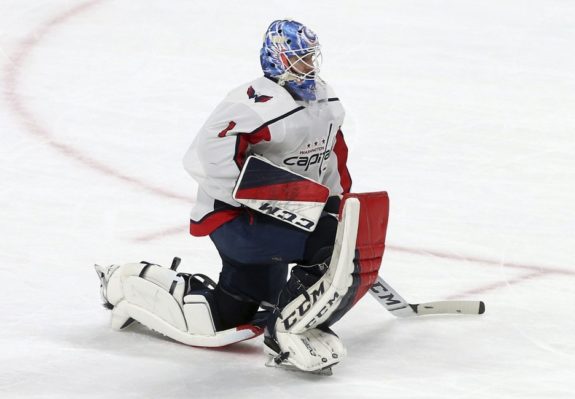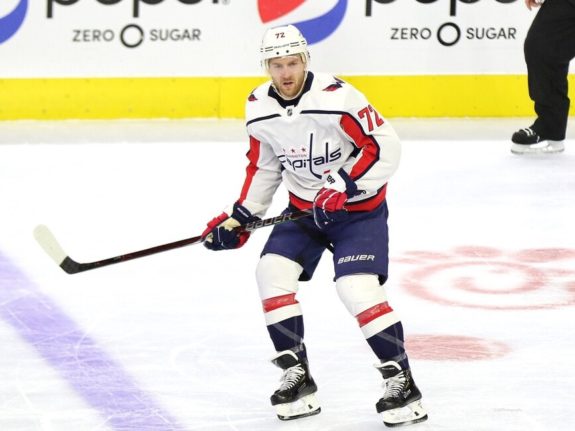The Washington Capitals could not decide between Christian Djoos and Chandler Stephenson, so they retained both. This means they are officially over the NHL’s $81.5 million salary cap.
The 25-year-old Stephenson agreed to a one-year, $1.05 million deal with the Capitals on Saturday, avoiding an arbitration hearing that would have been scheduled for Aug. 1. This makes him the 23rd man on the 2019-20 Capitals roster for the time being. With the cap hit from Stephenson’s contract, and the $1.2 million from Djoos’ deal, as awarded by arbitration on Wednesday, the Capitals are now $1.3 million over the salary cap, and have until the start of the season to pare down their payroll.
Here’s Your Money, Now Get Out
In most cases, the cheap and easy solution to a team’s salary cap problem is to send a player down to the minor leagues. This is not new for general manager Brian MacLellan, who also found himself in this situation last year. To get the Capitals under the cap, he sent defenseman Jonas Siegenthaler down to the AHL’s Hershey Bears, where his $714,166 cap hit would not be counted as part of the payroll. With Stephenson on the roster, the Capitals now have two extra forwards, which would theoretically make him the next target for a budget-cutting demotion.

This year, however, it will not be enough to send one player down. The Capitals’ $1.3 million shortfall represents approximately two minimum entry-level player contracts.
Complicating matters further is the team’s unbalanced roster. The Capitals shopped aggressively for forwards during this off-season, both in the draft and during free agency. As a result, they have 14 forwards signed to their roster and only seven defensemen – one more than the minimum needed to make it through a game. Sending down Siegenthaler again would leave the team with no margin for error if another defenseman suffers an injury during a game.
The Capitals could send another defenseman up from Hershey to replace Siegenthaler, but that would defeat the entire purpose of making cap space. Only two defensemen on the Capitals’ reserves – Colby Williams and Tyler Lewington – take up a smaller cap hit than Siegenthaler, and both by less than $50,000 – barely scratching the surface of the Caps’ burden.
Killing Two Birds with One Stone
Of course, the Capitals’ signings have not strictly been limited to forwards. One of the decisions the Capitals made on the first day of free agency was to sign Hershey goaltender Vitek Vanecek to a three-year, $2,150,000 extension with an average annual value of $716,667. Vanecek helped guide the Bears to a division title last season and finished with a goals-against-average (GAA) of 2.62.

There is already a second goaltender on the Capitals’ roster, Pheonix Copley, who still has three years remaining at an average annual value of $1.1 million. In his first season of sustained NHL action, he won 16 of his 24 starts while posting a GAA of 2.90. However, sprinkled among those starts was the occasional stinker, such as his seven-goal letdown in January against the Nashville Predators, or the November encounter with the Montreal Canadiens where he allowed three goals in the first two minutes of the second period and was subsequently pulled.

It would not be too far a stretch to suggest that MacLellan would want to make maximum use of his new investment and give Vanecek some prime NHL experience backing up Braden Holtby. Sending Copley down and swapping him for Vanecek would free up $358,333 – on its own, not nearly enough to put the Capitals in the black, but combined with sending Stephenson down to the AHL, should put them under the line by roughly $40,000.
The Salary Dump Trade
The quickest and dirtiest solution to a team’s salary cap woes is to simply dump most of a player’s salary on a team who can afford it through a trade, and it’s likely that MacLellan is keeping that option in the back of his mind right now. Last season, he and the Capitals benefited from such a move; after trading away recently-retired defenseman Brooks Orpik, the Colorado Avalanche bought out the remainder of his contract and placed him on waivers, freeing up some much-needed space for the Capitals, who re-signed him for one more season at a bargain.
Most of the expensive contracts on the team, such as Alex Ovechkin and Braden Holtby, are protected by no-trade clauses, leaving few viable choices on the roster for MacLellan to sacrifice. Having just signed his contract, Stephenson is more-or-less off-limits for a trade. However, Copley is still fair game, should the Capitals choose to go with Vanecek as their backup.
Another option is Travis Boyd, the Caps’ fourth-line winger who stands to make $800,000 this season. He missed the first month of the 2018-19 season due to injury, but recovered to finish with five goals and 15 assists in 53 games. His generally weak play on defense is a major sticking point, however, and may cause him to lose playing time to new pickups Garnet Hathaway and Brendan Leipsic. Still, there are many teams where he could be a valuable asset.

Whatever the Capitals choose to do to trim their salary cap burden, they are not short on options, but they are short on time. If there’s one thing Capitals fans have learned this off-season, it’s that the job of a general manager does not come with any breaks.